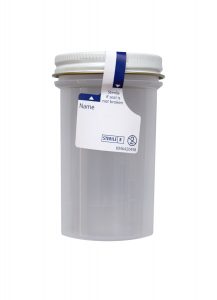Test Name
Streptococcus pneumoniae Antigen, Urine (SPNAG)
CPT Code
87899
Turnaround Time
24 hours
Reference Range
Negative
Specimen Requirements
Volume:
2 mL
Minimum Volume:
0.5 mL
Collection Container:
Sterile specimen container
Transport Temperature:
Refrigerated
Stability
Ambient:
24 hours
Refrigerated:
14 days
Frozen:
14 days
Additional Information
Background Information
Streptococcus pneumoniae is the most common organism recovered from patients with community-acquired pneumonia (CAP). Other frequent etiologies of community-acquired pneumonia include Mycoplasma pneumoniae, Haemophilus influenzae, Chlamydophila pneumoniae, and respiratory viruses.
Many different organisms can cause community-acquired pneumonia; risk factors for specific pathogens are available in the consensus guidelines for the management of community-acquired pneumonia, which was jointly developed by the Infectious Diseases Society of America (IDSA) and the American Thoracic Society.[1]
Clinical Indications
Findings suggestive of community-acquired pneumonia (CAP) include productive cough, fever, pleuritic chest pain, hypoxemia, and an imaging study demonstrating a pulmonary infiltrate.
Microbiologic tests to determine the specific cause of community-acquired pneumonia are often negative; however, if the etiology of CAP is determined, empiric therapy can be optimized to decrease morbidity and mortality. De-escalation of therapy can reduce pressure on the emergence of drug resistance and avoid toxic drug effects.
Sputum and blood cultures (prior to initiation of antimicrobial therapy) are recommended for the evaluation of patients with suspected CAP. Recovery of an organism confirms the diagnosis and allows in vitro susceptibility testing to be performed.
Gram stain of sputum is helpful to guide therapy and for correlation with culture results.
Antigen testing is useful when empiric antimicrobial therapy prevents culture confirmation of pneumococcal disease. Urine antigen testing for S. pneumoniae and Legionella pneumophila are recommended for patients with severe CAP.[1]
The S. pneumoniae antigen test has a specificity of >90% and a sensitivity of 50-80% for the diagnosis of pneumococcal pneumonia in adults.[1] However, urinary antigen tests are not recommended for the diagnosis of pneumococcal pneumonia in children because false positive tests are common and attributed to nasopharyngeal colonization with S. pneumoniae.[2, 3]
Methodology
Cleveland Clinic Laboratories uses a qualitative immunochromatographic membrane assay (BinaxNOW® Streptococcus pneumoniae) to detect pneumococcal soluble antigen in human urine. The S. pneumoniae antigen test provides a rapid, simple method for the presumptive diagnosis of pneumococcal pneumonia.
A urine specimen should be collected prior to antimicrobial therapy in a clean, leak-proof container. The specimen may be stored at room temperature if assayed within 24 hours of collection.
Urine is stable for two weeks if refrigerated or frozen. Boric acid may be used as a preservative; however, other preservatives are unacceptable.
Interpretation & Limitations of the Assay
A positive result is presumptive evidence of pneumococcal pneumonia. Correlation of test results with clinical findings is required.
A negative result does not exclude infection by S. pneumoniae since the antigen present in the sample may be below the detection limit of the test.
This test has not been evaluated on patients taking antibiotics for more than one day, or on patients who recently completed a course of antibiotic therapy.[4]
Cross-reactivity with closely-related bacteria in the Streptococcus mitis group may occur.
Streptococcus pneumoniae vaccine may cause false positive results within two days following vaccination, and is not recommended within five days following pneumococcal vaccination.
This test has only been validated for urine samples.
Antigen testing is not recommended for the diagnosis of pneumococcal pneumonia in children.[2, 3]
References
1. Mandell LA, Wunderink RG, Anzueto A, et al. Infectious Diseases Society of America/American Thoracic Society consensus guidelines on the management of community-acquired pneumonia in adults. Clin Infect Dis. 2007 Mar 1; 44 (Suppl 2):S27-72.
2. Dowell SF, Garman RL, Liu G, et al. Evaluation of Binax NOW, an assay for the detection of pneumococcal antigen in urine samples, performed among pediatric patients. Clin Infect Dis. 2001;32:824-825.
3. Bradley JS, Byington CL, Shah SS, et al. The management of community-acquired pneumonia in infants and children older than 3 months of age: clinical practice guidelines by the Pediatric Infectious Diseases Society and the Infectious Diseases Society of America. Clin Infect Dis. 2011;53(t):e25-e76.
4. BinaxNOW® Streptococcus pneumoniae, Package Insert, Alere, Ref. IN710050, Rev. 3, 5/7/10.

